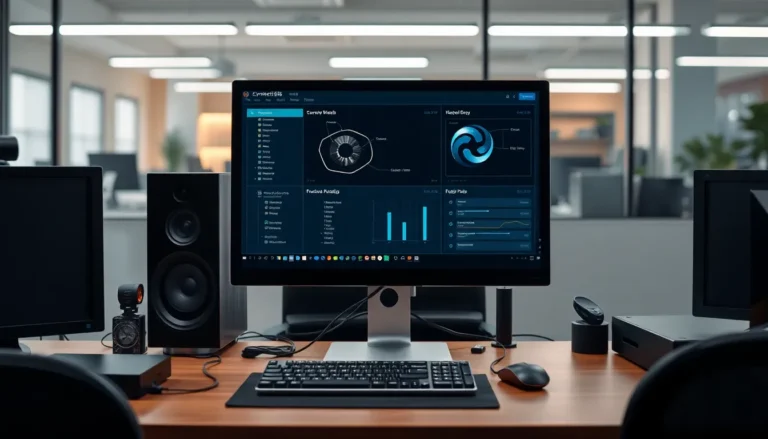Table of Contents
ToggleIn the fast-paced world of tech, DevOps project management is like the secret sauce that turns a good burger into a gourmet delight. It’s where collaboration meets automation, and magic happens. If you think managing projects is just about timelines and to-do lists, think again. It’s about creating a culture that fosters innovation while keeping everyone on the same page—without the chaos of a three-ring circus.
Picture this: teams working seamlessly, deploying updates faster than you can say “continuous integration.” With the right DevOps practices, not only can you streamline processes, but you can also boost morale and productivity. So, buckle up as we dive into the world of DevOps project management, where efficiency meets a touch of humor, and success is just a sprint away.
Overview Of DevOps Project Management
DevOps project management integrates development and operations teams to enhance collaboration. Emphasizing communication, this approach allows for quicker resolution of issues. Teams adopting DevOps practices report significant reductions in development cycles. Enhanced automation tools streamline processes, enabling more frequent updates.
Strategies focus on fostering a culture that promotes continuous improvement. Teams benefit from shared responsibilities, breaking down traditional silos. Increased transparency in workflows leads to higher accountability. Frequent feedback loops ensure that any concerns are addressed promptly, improving overall project outcomes.
Key performance indicators (KPIs) measure success in a DevOps environment. Metrics such as deployment frequency and lead time for changes provide insights into efficiency. High-performing teams utilize these metrics to identify areas for improvement.
Collaboration tools play a crucial role in DevOps project management. Applications like Jira and Trello support task tracking and ensure that all team members remain aligned. Utilizing these tools, teams can visualize project progress and respond quickly to evolving requirements.
DevOps also encourages experimentation, allowing teams to adopt new technologies with confidence. Teams that embrace this mindset often discover innovative solutions to complex problems. As a result, flexibility becomes a hallmark of successful DevOps implementations.
Overall, prioritizing collaboration and automation in project management leads to efficient workflows. Organizations keen on adopting DevOps can expect enhanced productivity, improved morale, and consistently successful project outcomes.
Key Principles Of DevOps Project Management
DevOps project management revolves around several core principles that drive efficiency and collaboration in tech projects. Understanding these principles enhances the effectiveness of teams and outcomes.
Collaboration And Communication
Effective collaboration and communication form the backbone of DevOps project management. Teams collaborate across functions, breaking down silos to improve overall workflow. Regular meetings and updates ensure transparency and alignment on goals. Tools like Slack and Microsoft Teams facilitate real-time discussions, allowing quick resolutions to issues. Shared documentation fosters knowledge sharing among team members. High levels of communication boost confidence, promoting a culture of innovation. Leaders encourage open feedback, which strengthens relationships and motivates teams. A focus on these practices significantly impacts project success rates.
Continuous Integration And Deployment
Continuous integration and deployment (CI/CD) streamline the development process in DevOps. These practices enable teams to integrate code changes frequently, minimizing integration issues. Automated testing reduces the risk of introducing bugs, ensuring high-quality software. Deployment processes become more efficient with automation tools, allowing for quicker releases. Frequent updates enhance user satisfaction, keeping services competitive. Metrics from deployment frequency and lead time provide insights into efficiency. Feedback loops between development and operations teams improve future iterations. Emphasizing CI/CD leads to faster innovation and a more agile response to market demands.
Tools For DevOps Project Management
DevOps project management relies on various tools to enhance productivity and collaboration. These tools streamline communication, automate tasks, and facilitate real-time feedback.
Project Management Tools
Project management tools play a crucial role in keeping teams organized. Jira stands out with its robust feature set for tracking tasks and managing workflows. Trello offers a visual approach with boards and cards that simplify task management. Asana enables users to set priorities and deadlines, ensuring projects stay on track. Each of these tools contributes to improving team alignment and accountability, making project management more efficient.
Automation Tools
Automation tools significantly enhance the DevOps lifecycle. Jenkins serves as a popular choice for continuous integration and continuous deployment, simplifying code integration and testing. GitLab CI/CD offers built-in automation for deployment processes, leading to quicker updates. CircleCI provides a cloud-based solution, allowing teams to automate builds and tests seamlessly. By using these tools, teams can focus on innovation instead of repetitive tasks, improving overall project success.
Common Challenges In DevOps Project Management
DevOps project management faces several common challenges that can hinder success. Communication issues create misunderstandings between development and operations teams. Misalignment in goals often leads to conflicting priorities, slowing down project progress. Resistance to change can block the adoption of new tools and methodologies, resulting in outdated practices.
Collaboration barriers arise when teams work in silos instead of together. Ineffective use of project management tools can complicate task tracking, creating further delays. Automation might not fully integrate with existing systems, causing disruptions in workflows. Technical debt accumulates when teams prioritize immediate fixes over long-term solutions, impacting quality.
Monitoring and measuring success presents difficulties as well. Establishing relevant key performance indicators (KPIs) can prove challenging in fast-paced environments. Additionally, data from multiple sources may not correlate, complicating analysis and decision-making. Ensuring all team members are aligned with defined metrics remains essential for tracking progress.
Conflict resolution becomes necessary when team members encounter disagreements on project direction. Prioritizing consistent feedback loops can help address concerns promptly. Moreover, the lack of clear documentation often leads to confusion, especially when onboarding new team members.
These challenges can significantly impact both project timelines and outcomes. By recognizing these obstacles, teams can develop strategies to mitigate risks. Fostering a culture of collaboration and continuous improvement enables organizations to overcome hurdles and achieve DevOps success efficiently.
Best Practices For Effective DevOps Project Management
Prioritizing collaboration enhances project success. Establish clear communication channels among team members. Utilizing tools like Slack and Microsoft Teams fosters real-time discussions, streamlining information flow. Implementing continuous integration and deployment practices minimizes integration issues and accelerates software quality through automated testing.
Adopting specific key performance indicators allows teams to measure progress effectively. Tracking metrics such as deployment frequency and lead time for changes provides insights into efficiency. Integrating project management tools like Jira and Trello improves organization and accountability within teams.
Encouraging a culture of continuous improvement empowers teams to innovate and experiment with new technologies. Team members gain confidence in their ability to try novel solutions, leading to enhanced productivity. Fostering an environment where feedback is welcomed creates opportunities for refinement in processes.
Recognizing and addressing common challenges plays a crucial role in maintaining project momentum. Misalignment of goals often leads to confusion and inefficiency. Promoting shared responsibilities among team members can bridge gaps that arise from working in silos. Ensuring proper documentation reduces misunderstandings and helps keep everyone on the same page.
Streamlining automation tools such as Jenkins and CircleCI simplifies the integration, testing, and deployment processes. Teams can shift their focus from repetitive tasks to strategic initiatives, maximizing their potential. Finally, maintaining transparency throughout project processes strengthens accountability and builds trust among team members, thus driving successful outcomes in DevOps project management.
DevOps project management is essential for thriving in today’s fast-paced tech landscape. By prioritizing collaboration and effective communication, organizations can break down silos and foster a culture of innovation. The right tools and practices empower teams to streamline processes and enhance accountability.
Embracing automation not only simplifies workflows but also allows teams to focus on strategic initiatives rather than repetitive tasks. As organizations adopt these principles, they can expect improved morale, increased productivity, and ultimately, successful project outcomes. The journey towards effective DevOps project management is ongoing, but the rewards are well worth the effort.







